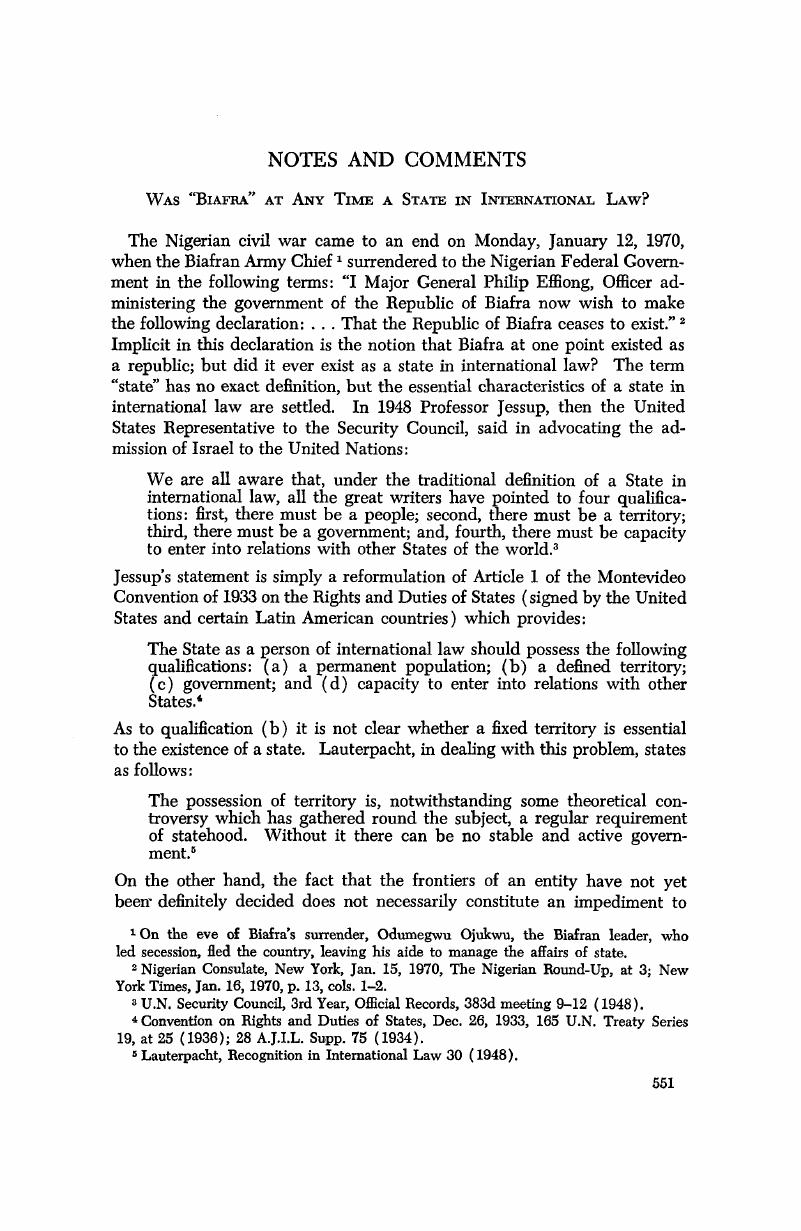Published online by Cambridge University Press: 28 March 2017

1 On the eve of Biafra's surrender, Odumegwu Ojukwu, the Biafran leader, who led secession, fled the country, leaving his aide to manage the affairs of state.
2 Nigerian Consulate, New York, Jan. 15, 1970, The Nigerian Round-Up, at 3; New York Times, Jan. 16, 1970, p. 13, cols. 1-2.
3 U.N. Security Council, 3rd Year, Official Records, 383d meeting 9-12 (1948).
4 Convention on Rights and Duties of States, Dec. 26, 1933, 165 U.N. Treaty Series 19, at 25 (1936); 28 A.J.I.L. Supp. 75 (1934).
5 Lauterpacht, Recognition in International Law 30 (1948).
6 5 Annual Digest of Public International Law Cases 11, at 15 (Case No. 5) (1929-30).
7 It is interesting to note that Sec. 4 of the Restatement, Second, Foreign Relations Law of the United States, requires not mere capacity to enter into international relations, but actual participation in international relations. This section provides that “state … means an entity that . . engages in foreign relations” (Emphasis added).
8 Letter from U.S. Representative to the United Nations to the President of the Security Council, Feb. 28, 1966, 54 Department of State Bulletin 588 (1966).
9 Secession was declared on May 30, 1967 (6 Int. Legal Materials 679-680 (1967)), and the first recognition was given by Tanzania on April 13, 1968; see below.
10 Chief Awolowo, first Premier of Western Nigeria, is currently the leader of the Yorubas in Nigeria, Vice Chairman of the Federal Executive Council and Federal Commissioner for Finance.
11 Front-page comment, West Africa, May 25, 1968.
12 New Nigerian, April 15, 1968, p. 1; 15 Africa Digest 48 (June, 1968). See also New York Times, April 14, 1968, p. 5, col. 1.
13 New Nigerian, loc. cit.; also West Africa, March 25, 1967, p. 395.
14 15 Africa Digest 48 (June, 1968).
15 West Africa, May 18, 1968, p. 593. See also New York Times, May 9, 1968, p. 5, col. 5.
16 Ibid., May 16, 1968, p. 17, col. 7.
17 West Africa, May 25, 1968, p. 662; see also New York Times, May 21, 1968, p. 3, col. 7.
18 Time, Jan. 26, 1970, p. 21.
19 New York Times, Aug. 1, 1968, p. 3, col. 7; 15 African Digest 92 (October, 1968).
20 Time, Jan. 26, 1970, p. 21.
21 Schwarzenberger, A Manual of International Law 33 (3rd ed., 1952); quoted in 2 Whiteman, Digest of International Law 665 (1963).
22 The Times (London), April 17, 1968, p. 9, col. 3.
23 Report on the O.A.U. Consultative Mission to Nigeria, at 9.
24 1936 Annuaire de l'Institut de Droit International 300-301; quoted by Brown, P. M., “Recognition of Israel,” 42 A.J.I.L. 620-621 (1948).Google Scholar
25 Various legal scholars have argued that this rule of individual recognition through the free choice of states should be replaced by collective recognition through an international organization such as the United Nations. See Wright, Quincy, “Some Thoughts about Recognition,” 44 A.J.I.L. 548 (1950)Google Scholar. Kelsen, in The Law of the United Nations 947 (1951), holds the view that the admission to the United Nations of a community not yet recognized by a Member means that the United Nations has, through the General Assembly and the Security Council, recognized this community as a state, since, according to Art. 4 of the Charter, only states can be admitted to membership. For the opposite view, see 2 Whiteman, Digest of International Law 46 (1963), where De Visscher's Theory and Reality in Public International Law 229-230 (1957) is quoted: “Further, the admission of a State by the organs of the United Nations does not imply its recognition by the States members individually, any more than it entails any obligation on these members to recognize its government or to maintain diplomatic relations with it… . Neither Article 4 not Article 78 of the Charter is any authority to the contrary. The scope of these provisions is limited to institutional relations regulated by the Charter; in the absence of any explicit provision, they cannot be extended to cover the individual and strictly political relations of the States members.“
26 Ambassador Austin (U.S.A.), U.N. Security Council, 3d Year, Official Records, 294th meeting at 16 (1948); see also Bishop, International Law, Cases & Materials 292 (2nd ed., 1962); Brierly, The Law of Nations 140 (6th ed., 1963).
27 J. E. S. Fawcett, The Law of Nations 41 (1968).
28 Schwarzenberger, Manual of International Law 73 (5th ed., 1967).
29 1 Oppenheim, International Law 127 (8th ed., H. Lauterpacht, 1955).
30 Brierly, op. cit. note 26 above, at 139.
31 Starke, An Introduction to International Law 123-124 (5th ed., 1963).
32 Lauterpacht, op. cit. note 5 above, at 6. This view is well summarized in Friedmann, Lissitzyn, and Pugh, op. cit. note 8 above, at 165.
33 Schwarzenberger, op. cit. note 28 above, at 73.
34 Briggs, , “Recognition of States,” 43 A.J.I.L. 113-121 (1949).Google Scholar
35 Brierly, op. cit. note 26 above, at 138.
36 Lauterpacht, op. cit. note 5 above, at 45-46.
37 Brierly, op. cit. note 26 above, at 138.
38 Lauterpacht, op. cit. note 5 above, at 46.
39 Higgins, The Development of International Law Through the Political Organs of the United Nations 138 (1963). See also 1 Hyde, International Law 153 (2nd ed., 1945): “The according of recognition to a country still in the throes of warfare against the parent State … constitutes participation in the conflict. It makes the cause of independence a common one between the aspirant for it and the outside State. Participation must be regarded as intervention, and therefore essentially antagonistic to that State.“
40 Brierly, op. cit. note 26 above, at 138.
41 Lauterpacht, op. cit. note 5 above, at 9.